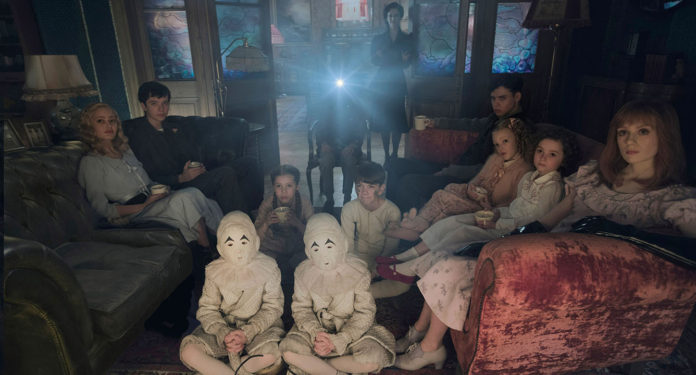
By Lindsey McLemore | Reporter
I’ve been a fan of Tim Burton’s films my entire life. With my pink hair and passion for all things spooky, that comes as little surprise to most people. Walking into the theater to see “Miss Peregrine’s Home for Peculiar Children,” I felt like I was going to visit an old friend. Walking out, I felt more like I’d run into my middle school gym coach at H-E-B. I will watch anything with Tim Burton’s name on it without even seeing a preview, but my love for Burton’s films doesn’t make me blind to the plot holes, questionable casting decisions or poorly developed plot in “Miss Peregrine’s Home for Peculiar Children.”
The film is based off of Ransom Riggs’ young adult book series and tells the story of a group of children with special gifts, or “peculiarities.”
In the film, a group of children live in a home with their teacher Miss Peregrine (yes, she turns into a peregrine falcon), and their peculiarities range from invisibility to a scary looking mouth on the back of the neck that must be fed at mealtimes.
From there, the entire concept gets a bit foggy.
Characters somehow get from one place to another without known transportation, some deaths/disappearances are not clearly explained and the ending might as well have said, “And they all lived happily ever after.”
Miss Peregrine’s home isn’t Hogwarts where parents send their children to learn how to use magic, but it’s also not quite Xavier’s School for Gifted Youngsters, where young mutants go to learn how to control their own powers and how they can help society. The purpose of the school is loosely explained in bits and pieces throughout the first half of the film.
Overall, the laws and rules of the universe are nowhere near as defined as those in Harry Potter or Marvel, making the film hard to follow.
A lot of the children’s peculiarities felt a little too convenient.
The main character, Jake, played by Asa Butterfield, can see hollows, which are dangerous invisible creatures that feed on the eyeballs of peculiars. This is his peculiarity. Later, it is explained that the Hollows are actually just the subject of an experiment on peculiars gone wrong and are not naturally occurring.
This important plot point is explained during the few minutes my friend chose to go to the restroom, so good luck following the rest of the movie if you miss that explanation, because he could not. Why would a naturally occurring peculiarity be to see things that are not even supposed to exist in the first place?
Similarly, Emma, played by Ella Purnell, would float away without her lead shoes. However, her peculiarity is her control of air and wind. How does she not have enough control over the air to keep her own two feet on the ground?
The twins, played by Joseph and Thomas Odwell, spend most of the film in the background but suddenly play an all-too-convenient role in saving the day.
The entire film feels like a slowly developing exposition, and the epic good vs. evil conflict at the end seems rushed and out of place when it finally happens.
Some of my questions can likely be answered in the book, but any good film adaptation should make sure as few of those questions exist as possible. At the very least, there shouldn’t be as many plot holes as there were here.
I had higher expectations for Tim Burton, but I also had higher expectations for the story in general, considering it has spent more than two years on the New York Times Best Seller List.
Before the film was even released, Burton sparked conversation by casting Samuel L. Jackson, the first person of color in a major role of a Burton film. Already known for not casting diverse actors, Burton gave Jackson the role of a particularly nasty villain.
When asked about diversity and representation in his films by a Bustle Burton said, “Things either call for it or they don’t,” but he still chose to cast the only person of color in a major role of this film as the villain, when the book did little to encourage a homogeneously white cast.
I was skeptical about “Miss Peregrine’s Home for Peculiar Children” after discovering the casting controversy. The plot holes and overuse of coincidence in Burton’s latest film have me questioning my loyalty.
The book is about peculiar children. It instantly attracted a certain audience that frequent Burton’s films, so it was a no-brainer for him to develop it into a movie. However, Burton should have said no to this one, because the concept of peculiars and the world they live in is underdeveloped. He should have put his efforts into something else (can I please get a Tim Burton – directed Scooby-Doo?).
“Miss Peregrine’s Home for Peculiar Children” isn’t a cash-grab but it was absolutely targeted at a very loyal audience that would hopefully have higher standards than what they were subjected to.





